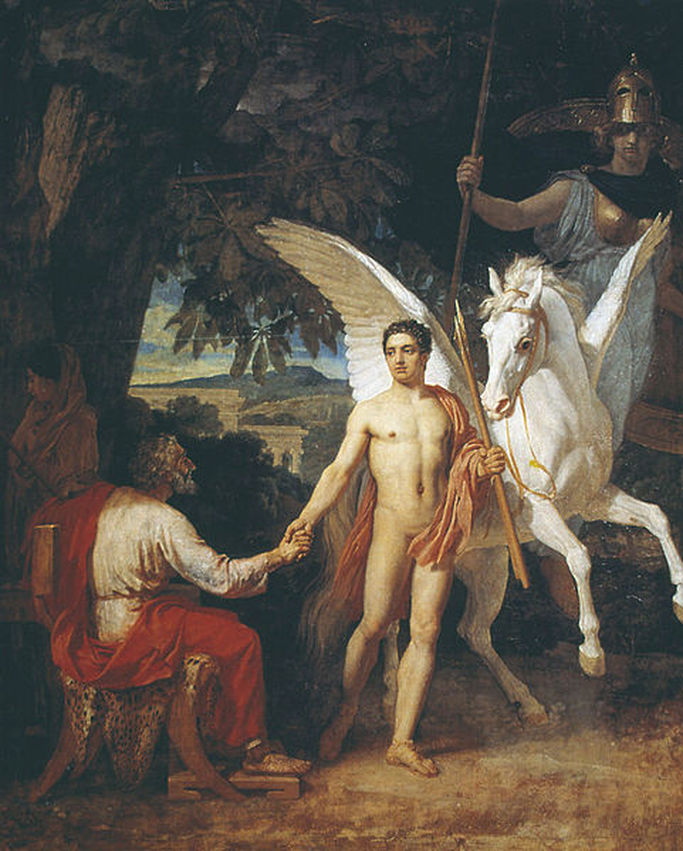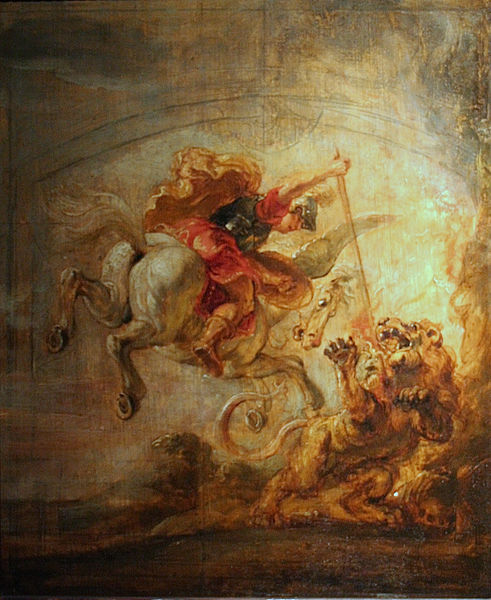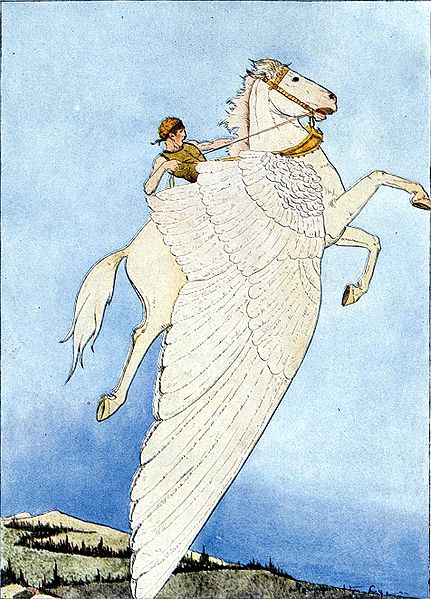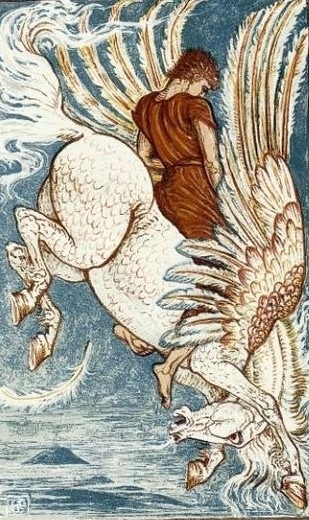BELLEROPHON IN GREEK MYTHOLOGY
The Greek Hero Bellerophon
The heroes of Ancient Greece are amongst the most famous characters to appear in the stories of Greek mythology, and the likes of Heracles and Jason have instantly recognisable names. The names, and indeed the deeds, of many other Greek heroes though, have been overlooked by many, but in antiquity the likes of Bellerophon was a famous figure.
Bellerophon of Corinth
The name of Bellerophon is one which appears in the works of Hesiod, as well as the Iliad by Homer, and the Bibilotheca by (Pseudo-)Apollodorus; and although the writers do not always agree on details, a time line of Bellerophon’s life can be ascertained.
Nominally, Bellerophon was considered to be the son of King Glaucus of Ephyra (Corinth), and his wife and queen, Eurymede. This would make him a grandson of Sisyphus.
Some would say that Glaucus himself could not have any children, for Zeus had punished Glaucus for the sins of his father, and as a result Bellerophon was actually a son of the sea god Poseidon.
It was also said that Bellerophon was actually initially named Hipponous but would be given a name whilst still a young man, when he slayed Bellerus, a Corinthian noble.
Nominally, Bellerophon was considered to be the son of King Glaucus of Ephyra (Corinth), and his wife and queen, Eurymede. This would make him a grandson of Sisyphus.
Some would say that Glaucus himself could not have any children, for Zeus had punished Glaucus for the sins of his father, and as a result Bellerophon was actually a son of the sea god Poseidon.
It was also said that Bellerophon was actually initially named Hipponous but would be given a name whilst still a young man, when he slayed Bellerus, a Corinthian noble.
Bellerophon ExiledShortly afterwards, Bellerophon was said to have been exiled from his homeland.
Occasionally it was said that it was the death of Bellerus that caused him to be sent into exile, although it was more common to state that Bellerophon was exiled because he was responsible for the death of his own brother, a brother named Deliades, Peiren or Alcimenes. |
|
Details of the death of Bellerophon’s brother, or indeed Bellerus, are not eluded to in the surviving sources, but it is known that Bellerophon would seek absolution for his crime from the king of Argos.
Kings of Ancient Greece had the power to absolve individuals of crimes, a fact often alluded to in the adventures of Heracles; and so Bellerophon would seek out Proetus, co-King of Argos, who had his seat of power in Tiryns.
Kings of Ancient Greece had the power to absolve individuals of crimes, a fact often alluded to in the adventures of Heracles; and so Bellerophon would seek out Proetus, co-King of Argos, who had his seat of power in Tiryns.
Bellerophon Falsely Accused
King Proetus would welcome Bellerophon as a worthy guest into his palace, after all, Bellerophon was a prince of neighbouring kingdom, and youth who already had the fighting skills expected of a hero. Proetus though was not the only one in the royal court to take a shine to Bellerophon, for Queen Stheneboea would become infatuated by the Corinthian prince.
Stheneboea would attempt to seduce Bellerophon, but Bellerophon rejected the advances; probably because of respect for his host. Rejection did not sit well with Stheneboea though, and in an act of retribution, the queen would falsely tell Proetus that Bellerophon had tried to force himself upon her.
Proetus believed his wife, but could do little with this information, for to cause harm to a guest, was considered one of the greatest wrongs that could be undertaken, and would bring down the wrath of the Erinyes upon him.
Stheneboea would attempt to seduce Bellerophon, but Bellerophon rejected the advances; probably because of respect for his host. Rejection did not sit well with Stheneboea though, and in an act of retribution, the queen would falsely tell Proetus that Bellerophon had tried to force himself upon her.
Proetus believed his wife, but could do little with this information, for to cause harm to a guest, was considered one of the greatest wrongs that could be undertaken, and would bring down the wrath of the Erinyes upon him.
Bellerophon Sent to Lycia
Proetus decided that no harm could come to Bellerophon in his own kingdom, but the same didn’t apply in another kingdom, and so Proetus convinced Bellerophon that he should travel to Lycia. Lycia at the time was ruled by King Iobates, the father of Stheneboea, and the man who had helped Proetus to reclaim his part of the inheritance.
Proetus believed that Iobates would kill Bellerophon for having tried to rape Stheneboea, but when Bellerophon arrived in Lycia, Iobates was faced with the same problem that Proetus had been, and was wary of invoking the anger of the Erinyes.
Instead, Iobates set Bellerophon a heroic quest, one which the king of Lycia assumed would cause the death of Bellerophon, for the quest was the slaying of the Chimera.
Proetus believed that Iobates would kill Bellerophon for having tried to rape Stheneboea, but when Bellerophon arrived in Lycia, Iobates was faced with the same problem that Proetus had been, and was wary of invoking the anger of the Erinyes.
Instead, Iobates set Bellerophon a heroic quest, one which the king of Lycia assumed would cause the death of Bellerophon, for the quest was the slaying of the Chimera.
Bellerophon and Pegasus
|
The Chimera was a fire-breathing monster that had made its home in Iobates kingdom, and would kill any traveller who passed near to its lair. The Chimera was a monster comprising part lion, part goat and part snake, with deadly claws, a poisonous tail, and of course the deadly breath.
Bellerophon readily accepted the quest of Iobates, as any aspiring hero would, and Bellerophon was in fact undaunted by the task ahead of him, for unbeknownst to Iobates, Bellerophon had access to a secret weapon, Pegasus, the mythical flying horse. There are differing stories about when the association between Bellerophon and Pegasus occurred, with some telling of it occurring early in his life, when the goddess Athena came to the Corinthian youth, and presented him with a golden bridle, and told him where Pegasus drank. Other stories tell that Bellerophon became associated with Pegasus whilst in Lycia, with the noted seer Polyeidos telling him to sleep in the temple of Athena, at which point Athena came to assist the hero. In either case, the golden bridle of Athena, allowed Bellerophon to approach the winged horse, and soon Pegasus was allowing Bellerophon to ride upon its back. |
|
Bellerophon and the Chimera
|
Bellerophon would fly to the area where the Chimera was located in Lycia, and from the air, and well out of range of the fiery breath, Bellerophon let loose with his arrows. The arrows of Bellerophon though failed to penetrate the skin of the monstrous hybrid.
Again, Bellerophon was undaunted by the quest he faced, for quickly the Corinthian hero came up with a new plan, and ditching his bow and arrows, Bellerophon returned to the fight with a lance. This of course meant that Bellerophon would have to get closer to the Chimera, but Bellerophon’s plan was not to pierce the hide of the monster, for Bellerophon had embedded a block of lead upon his lance. |
Aiming true, Bellerophon directed his lance into the mouth of the Chimera, and as he did so, the fiery breath of the monster melted the lead, causing it to flow down its throat. Subsequently, the lead hardened again, suffocating, and killing the Chimera.
Bellerophon and the Solymi
|
The victorious Bellerophon would return to the Lycian royal court, but the shock of seeing Bellerophon unharmed quickly passed, and soon Iobates came up with a second plan to kill off the Greek hero. A barbarous tribe, known as the Solymi, lived on the northern borderland of Lycia. Troublesome in nature, Iobates figured that Bellerophon would be overpowered by pure numbers of opponents, but making use of Pegasus again, Bellerophon ensured that he did not get in a position to be overpowered, and easily picked off individuals, before the rest of the Solymi fled further north.
|
|
Bellerophon and the AmazonsReturning again to the court of Iobates, the king once again hatched a plan to kill Bellerophon.
Lycia had been invaded by a strong force of Amazons, the legendary race of warrior women; and so Bellerophon was dispatched by Iobates to rid the kingdom of this threat. Strong and as skillful as the Amazons were, Bellerophon had already overcome worse in the form of the Chimera, and so Bellerophon went into battle again from the back of Pegasus. Keeping out of reach of the Amazons’ weapons, Bellerophon would use his own weapons, including boulders, to force the band of Amazons back beyond the border of Lycia. |
Bellerophon and the Palace Guards
News of Bellerophon’s victory over the Amazon reached Iobates before the hero, and so the king of Lycia made one last plan to kill Bellerophon, and this time the palace guards, and thus the strongest of the Lycian warriors, were placed in ambush. Strong as these warriors were, they were no match for Bellerophon and Pegasus, for once again Bellerophon ensured he was positioned out of harm’s way; and so the ambush failed in its attempt.
Bellerophon Marries
|
Returning once again unharmed, Iobates finally gave up on trying to cause the death of Bellerophon; indeed, the king came to believe that Bellerophon was being protected by one of the gods, or goddesses, of Mount Olympus.
Iobates would explain to Bellerophon about why the king had been making the life of his guest so uncomfortable, and to make amends, Iobates decided to give Bellerophon the hand of Philonoe, the daughter of the king in marriage. Additionally, Iobates named Bellerophon the heir to the throne of Lycia. |
|
Bellerophon would become father to two sons by Philonoe, Isander, who would later die fighting the Solymi, and Hippolochus, who became father of Glaucus, one of the defenders of Troy.
Bellerophon was also father to one or two daughters, for named daughters were Laidameia and Deidameia, although this might be the names of a single daughter. In some versions of the Sarpedon myth, Deidameia, was the mother of that defender of Troy.
Bellerophon was also father to one or two daughters, for named daughters were Laidameia and Deidameia, although this might be the names of a single daughter. In some versions of the Sarpedon myth, Deidameia, was the mother of that defender of Troy.
Bellerophon Falls to Earth
|
Now some versions of the Bellerophon myth end at this point, and many like to think of Bellerophon living happily ever after, but almost no Greek hero ever lived out their days happily, and Bellerophon was no exception.
The victory of Bellerophon over the Chimera and the Amazons gave the Greek hero an inflated sense his own importance, and Bellerophon decided that he was worthy of an invite to Mount Olympus. Bellerophon though was not prepared to wait for one of the god’s to invite him to the home of the gods, and so Bellerophon took to the back of Pegasus once again, and decided to fly to Mount Olympus. Zeus observed the impudence of Bellerophon from his throne, and being in no mood to be charitable, the supreme god sent forth a gadfly. The gadfly would sting Pegasus causing to buck in pain; the motion of Pegasus was so abrupt that Bellerophon was unseated, and so Bellerophon fell to earth. |
Neither the fall, nor the landing, killed Bellerophon, but it did leave him crippled and blind. Subsequently, Bellerophon was shunned by both god and man, and died alone. Some, in antiquity, would tell of how the tomb of Bellerophon could be found in the hilltop citadel of Tlos in Lycia.
|
|
Colin Quartermain - Bellerophon - 2nd February 2017



